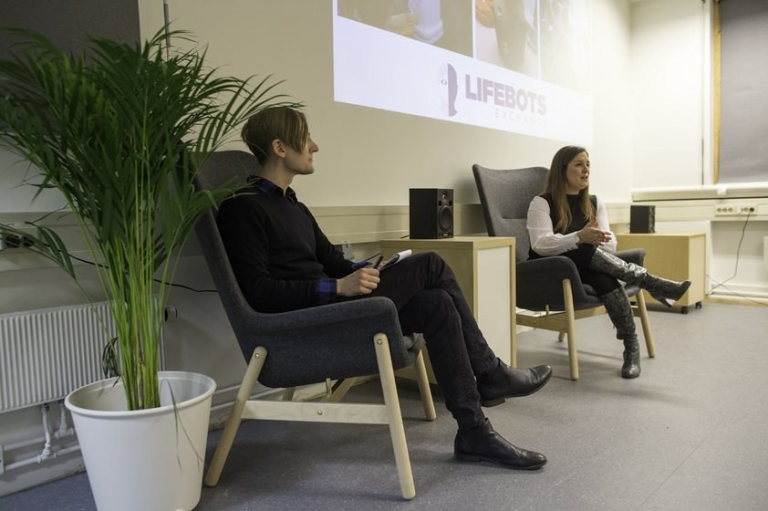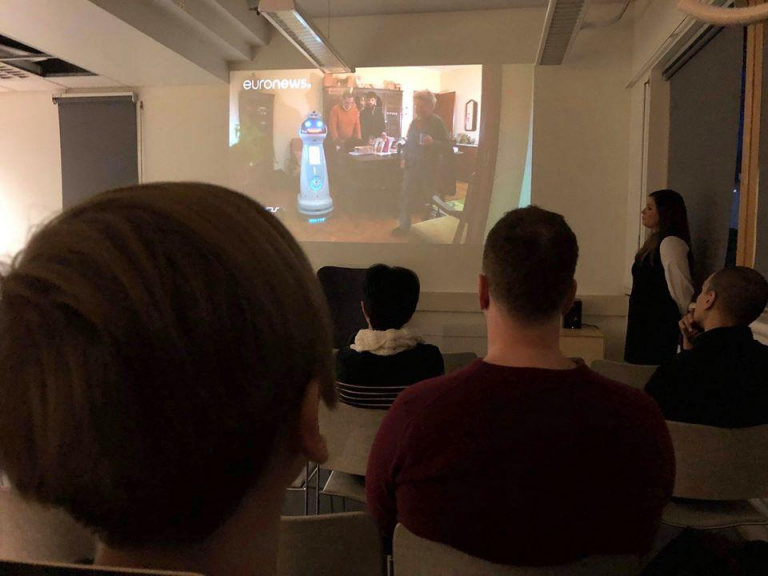Starting January 2020, Cyborg Cinema is a monthly event hosted by the ImRo-lab team. Each event features a presentation from an expert guest speaker, followed by a screening of a thematic robot-related film. Our goal is to create a casual space for learning and discussing new perspectives on robotics in society.
We want to confront questions like: ‘What challenges are societies facing when implementing robotic technology?’, ‘What should the relations between a robot and a user be?’, and many other ethical dilemmas.
We started our first Cyborg Cinema with a screening of Robot and Frank, a 2012 sci-fi comedy-drama about an aging burglar with worsening dementia who struggles to adapt to his new in-home care robot. However, Frank quickly changes his attitude towards the robot when he discovers the possibility of making it his new partner in crime, and they begin plotting a large-scale scheme. This movie explores several ethical questions, including that of pairing an unwilling user with a homecare robot against their wishes - and who is responsible when a user teaches their robot to commit criminal acts.
We opened the evening with an exciting presentation from Flávia Rodrigues, the Public Relations and Communication Manager at Cáritas Coimbra. She gave us insight into real experience with robot care for the elderly in Portugal.
Cáritas Coimbra and NTNU are project partners in the project LIFEBOTS Exchange. LIFEBOTS Exchange aims at enhancing cross-sector, international and interdisciplinary collaboration in the area of social robotics technology.

Flávia Rodrigues and Roger Søraa replying to questions from the audience.
The idea behind Cyborg Cinema borrows from the concept of sociotechnical imaginaries, a theory from Science and Technology Studies. This theory shows that technological innovations often appear in science fiction many years before they are realized in real life. An example of this is the ship computer on the U.S.S. Enterprise from Star Trek, which has served as an inspiration for Amazon and Google engineers when programming the now commonly recognized virtual assistants Alexa and Google Assistant. We believe that by understanding how we imagine technology, we are also able to better interpret, control and implement technological innovations. Linking fictional problems with existing knowledge on robotics in society enables us to discuss both hopes and fears related to advances in robotics and artificial intelligence.
Cyborg Cinema is a great opportunity to strengthen interdisciplinarity within NTNU and its affiliated associations. We also wish to welcome students from all study programs to participate in order to increase their involvement with the lab.
Please feel welcome to visit our screenings if you are interested in exploring the parallels between robots in fiction and reality and wish to partake in engaging conversations about relevant robot-related societal issues.
The next opportunity to attend Cyborg Cinema is February 27th, 2020. At this upcoming screening we will watch the 1975 cult classic “The Stepford Wives”, a film that explores the sinister truth behind the inexplicably truth behind the submissive housewives residing in small-town Stepford, Connecticut. This time Dr. Sofia Moratti from NTNU’s Center of Gender Studies will give us an opening presentation with an introduction on gender and technology. You can find more information about this screening on our event page, or on the Facebook event.

The audience watching a news report about a robot caretaker that Flávia works with.

